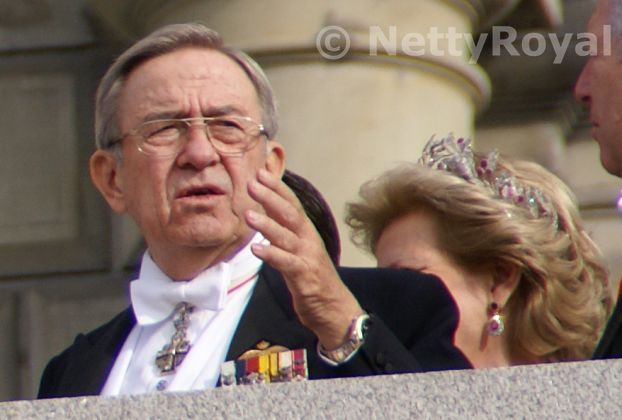On 6 March 1964 King Pavlos I of Greece died aged 63. His only son, Constantine II, became the new King of Greece. The 23-year-old king was good looking, rather popular, sportive and in 1960 had won a gold medal at the Olympic Games in Rome, Italy. On the other hand Constantine was too young and not yet fully prepared. On 18 September 1964 he married the young Princess Anne-Marie of Denmark. Soon two children were born to the family: Alexia (* 10 July 1965) and Pavlos (* 20 May 1967).
Inexperienced Constantine clashed with his Prime Minister Georgios Papandreou, who was a liberal reformer, and dismissed him on 15 July 1965. This caused a constitutional crisis. Finally Constantine appointed an interim government under Ioannis Paraskevopoulos. There were to be new elections on 28 May 1967. They would never be held.
On 21 April 1967 a group of right-wing army officers, led by Colonel Georgios Papadopoulos seized power and established a military dictatorship. During the coup d’état the Tatoi Palace was surrounded with tanks and the whole staff of the King was arrested. Constantine was forced to accept the new regime, also known as the Regime of the Colonels. On 13 December 1967, before dawn, he launched a counter-coup. The King flew with his wife, two children, his mother Queen Frederica, and his sister Princess Irene from Athens to Kavala, in the north of Greece. They hoped to create an alternative government in Thessaloniki. Within hours however the counter-coup had failed.

At night Constantine and his family had to go into exile and arrived in Rome, Italy, in the early morning of 14 December 1967. They would stay there for five years. For as short while they lived in Denmark and finally decided to settle down in London, Great Britain. Only on 1 June 1973 Constantine was declared deposed. Papadopoulos declared himself the President of the Republic of Greece. In a questionable referendum on 29 July 1973 the monarchy was officially abolished. The military regime didn’t survive for long. It fell in August 1974. Another referendum was being held on 8 December 1974, which confirmed the abolition of the monarchy. Only 30 % was in favour of the monarchy. Constantine could do nothing but accept.
Constantine hoped for a financial settlement for the property that was seized amongst others Tatoi and Mon Repos and began negotiations with the Greek government in 1986. Several times it almost seemed that he was lucky, but it never came to an agreement. In 1994 the royal estates in Greece were expropriated. Only in 2002 the European Court of Human Rights ruled that the Greek state was to compensate Constantine. He only received a fraction of the original $500 million he had originally sought in damages: 12 Million Euros. His sister Princess Irene received 900.000 Euros.
The family was extended with Nikolaos (* Rome 1 October 1969), Theodora (* London 9 June 1983) and Philippos (* London). When Queen Frederica died in 1981 the family was allowed to return to Greece for a few hours for the funeral at Tatoi. Only after the final financial settlement the Greek Royal Family freely were allowed to visit Greece again. The first visit was on 15 February 2003 to commemorate at the tombs of King Pavlos and Queen Frederica. Since members of the family visited the country regularly. In December 2013 the family surprised by announcing that the former King and his wife had decided to leave London and to move to Greece permanently, only months after their son Nikolaos and his wife Tatiana had made the same move. Earlier that year the family had sold their house in the north of London.
Whether Greece will ever be a monarchy again, is according to Constantine in the hands of the Greek people and it is up to them to decide. He would happily accept his role if the Greek people would ask him.

